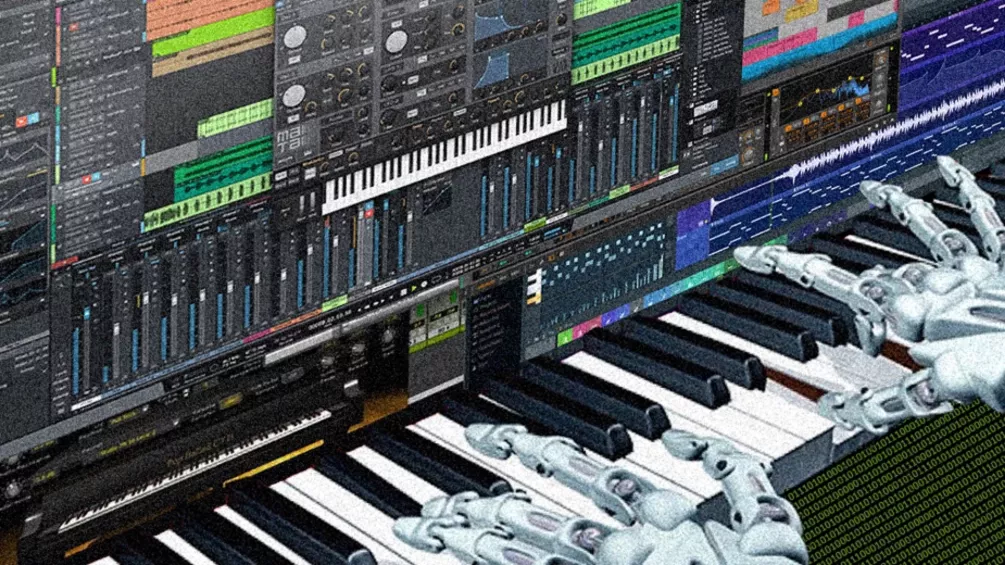10% of consumers surveyed said they had used generative AI to create music or lyrics in 2024
The use of AI in music continues to be a source of contention among musicians and consumers alike.
While the proliferation of AI in creative fields is relatively new, the topic has become increasingly prevalent, and fraught, in recent years. The first AI musician emerged as far back as 2017, but the lines between what is human-made and what is AI-generated are becoming increasingly blurred as technology advances.
According to the IMS Business Report 2025, which was released on 24th April to coincide with the first day of IMS Ibiza, 60 million people used AI software such as music creation music apps to create music in 2024. 10% of consumers surveyed said they had used generative AI to create music or lyrics in 2024.
MIDiA Research’s Mark Muligan, who authored the report, said that there would be a “drop off” as the “initial hype dies down”. However, he added, AI is doubtlessly going to „transform the music business, though perhaps not just in the way many people expect it to.”
“AI will find its way into all aspects of the music business,” he continued, “including automating A&R at scale.”
“AI will be used to help labels define their sound, with labels using AI tools to ensure tracks have the right sound, mix and mastering to fit their sonic identity. It will be used to help identify unclaimed royalties, to improve catalogue management, to improve royalty payments to artists and writers, to help fans discover music at a level that today’s algorithms can only dream of.”
“AI will also result in lots, and I mean lots, of new music being made. Some of this will be via tools that help producers to get good at something they are less good at (like mixing and mastering), or which help them find inspiration (e.g. producer co-pilots) and create samples and sounds that are unique to them rather than choosing from sample libraries that everyone else can use. But it will also result in a lot of best fit music — music made for the algorithm and for functional playlists.”
Concern is growing, however, that the boundaries between AI and human creation are becoming increasingly unclear. “Mainstream listeners will carry on unawares,” Mulligan continued, “happy with their ‘relaxing study’ and ‘intense workout’ playlists. But music fans will start looking elsewhere.”
In response, consumers are demanding greater transparency when it comes to the use of AI in music, according to a new survey of UK music listeners by the BPI.
The BPI’s data came from the latest All About The Music 2025 recorded music yearbook, a collaborative survey conducted by BPI and AudienceNet that asked 1,750 music consumers across the UK about their views around AI and their listening habits.
Specifically, the survey found that 81.5% of respondents believed that music generated solely by AI should be clearly labelled. 78.5% of those surveyed said an artist’s music or vocals should not be ingested or used by AI without permission from the artist or their record label. Over 80% said they value human-made music more than AI-generated music. Meanwhile, 71.5% of respondents said that governments had a duty to set restrictions on what AI can do.
Earlier this year, composer Max Richter joined a chorus of artists calling for regulation of AI, telling MPs that training AI systems on copyrighted music “unfair and unworkable“ for artists. Last year, a study found that music sector workers could lose 25% of income to AI in next four years. In February, Deezer reported that 10,000 fully AI-generated tracks were submitted to the platform each day, making up 10% of all new content.
This month, a lab-grown ‘brain’ made of late American avant-garde composer Alvin Lucier’s blood cells was able to create new music.
Revisit DJ Mag’s AI Futures series to see how AI is influencing DJing and producing.
60 million people used AI to create music in 2024, IMS Business Report 2025 finds – DJ Mag
RELATED ARTICLES
